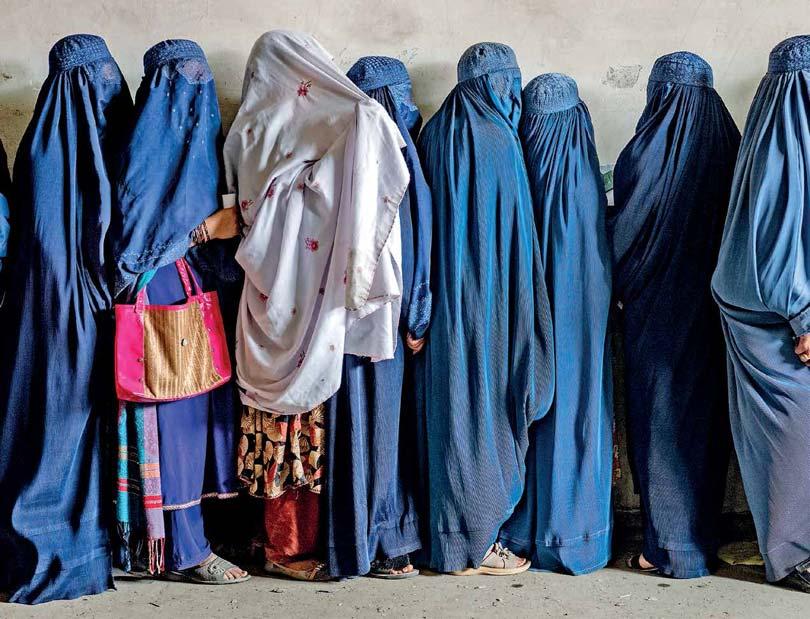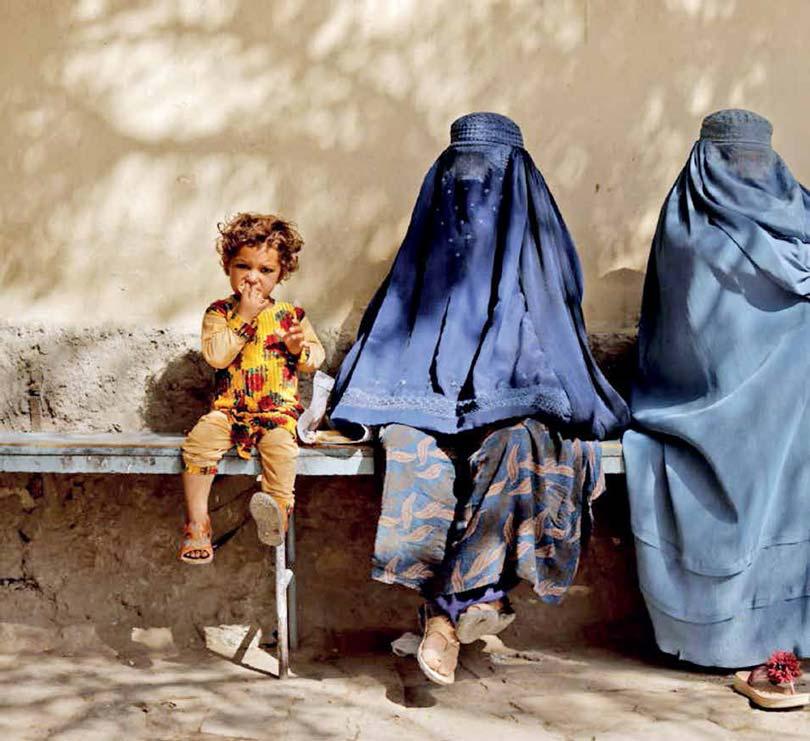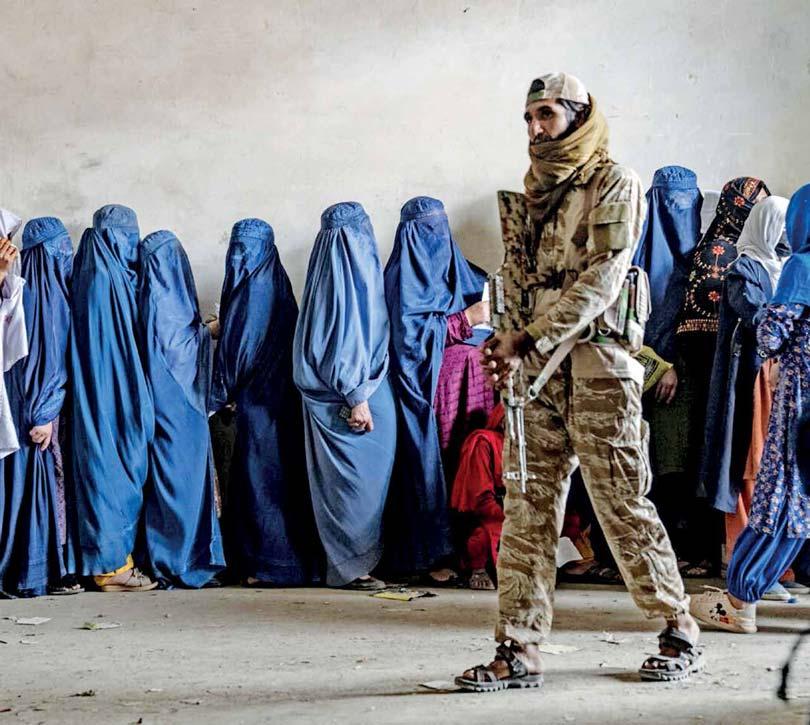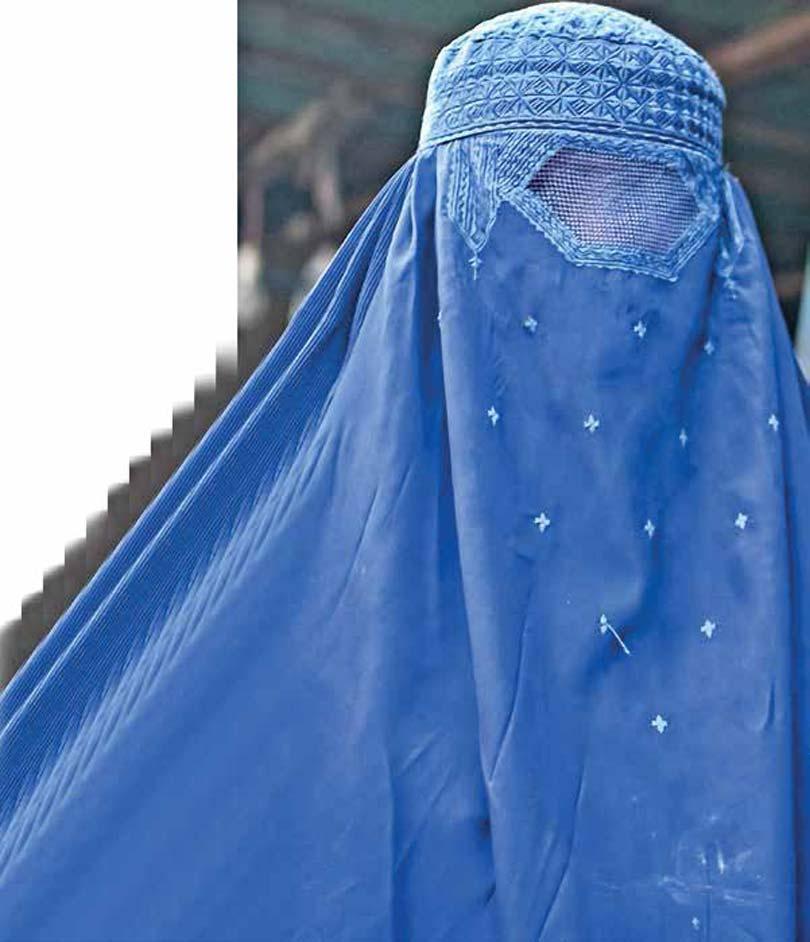



Enforcement is strict: male relatives become de facto enforcers; women risk detention, fines, or public flogging. In many households, even windows overlooking women's areas have been blocked to prevent women being seen at home.
Girls are barred from secondary schools and universities, women are prohibited from most jobs, and public speech, even singing or being heard, is punished.
Since returning to power on 15 August 2021, the Taliban have dismantled decades of progress for women and girls in Afghanistan. Over 70 decrees and directives have progressively stripped away rights to education, employment, freedom of movement, health care, public voice, and basic dignity. The Ministry for the Propagation of Virtue and the Prevention of Vice, established in place of the former Ministry of Women’s Affairs, enforces strict morality codes including dress, behaviour, and speech.
Education Denied: A Lost Generation
Afghanistan is currently the only country in the world where girls are banned from attending secondary school and university. More than 1.1 million girls aged 13–18 are out of school, and hundreds of thousands of women have been forced out of higher education since 2021. Some conservative Taliban officials have publicly opposed education bans, including Deputy Foreign Minister Mohammad Abbas Stanikzai, who called the continued ban an injustice, but he was swiftly punished internally and fled the country. In response, many girls are now attending over-subscribed madrassas, prioritizing religious instruction but lacking access to math, science, or modern subjects. The long-term impact threatens Afghanistan’s future in health, governance, and economics.
Employment and Economic Exclusion
Women have been removed from most sectors of the workforce, including UN agencies, NGOs, and government roles. A Taliban directive ordered all NGOs employing Afghan women to be shut down. Women’s businesses, while increasing in number, operate mostly in the informal sector, face limited financial access, and remain vulnerable. Women are also barred from training in medical professions, a major crisis in a country already plagued by high maternal mortality. UN Women data show that excluding women from the workforce costs Afghanistan around 2.5% of GDP per year, with cumulative losses potentially reaching two-thirds of GDP by 2066 if current policies persist.
Surveillance, Segregation, and Silence
The Taliban’s ‘vice and virtue’ law codified in August 2024 imposes broad new restrictions:
Women must cover their entire bodies and faces in public.
They are forbidden from speaking, singing, reading aloud, or even being heard outside the home.
They cannot make eye contact with non‑related men.
Women are banned from public spaces like parks, gyms, salons, and public libraries.
Enforcement is strict: male relatives become de facto enforcers; women risk detention, fines, or public flogging. In many households, even windows overlooking women's areas have been blocked to prevent women being seen at home.
Healthcare Crisis and Maternal Mortality
Following the December 2024 ban on women training as nurses, midwives, and health professionals, the healthcare system is collapsing, especially for women and children. Women cannot travel to clinics without a male guardian (mahram), often delaying care. One recent case involved a pregnant woman whose baby died due to checkpoint delays. Approximately 24 mothers and 167 infants die daily from preventable causes. Maternal mortality is projected to increase by up to 50% by 2026.
Mental Health Toll and Social Isolation
The psychological impact is staggering:
At least 8% of women surveyed report knowing someone who attempted suicide.
Activists report a pandemic of depression and despair, especially among young women shut out of education and public life.
Many women describe home confinement as literal imprisonment and yearning for fresh air.
Resistance and Resilience
Even under repression, Afghan women continue to resist. Over 170 street protests took place between 2021 and mid‑2024, often organized covertly through WhatsApp. Media initiatives like Radio Begum, run by women for women, and Zan TV, Afghanistan’s first female‑led television channel, continue providing education and empowerment despite Taliban harassment. Radio Begum was recently forced to cease broadcasting by authorities. Women artists and writers, both inside and in exile, continue documenting women’s stories and raising global awareness.
International Response and Accountability
Global institutions have condemned the Taliban’s gender policies:
The UN Security Council and UN Women demand immediate reversal of restrictions.
The International Criminal Court (ICC) issued arrest warrants on 8 July 2025 for Taliban leaders Hibatullah Akhundzada and Abdul Hakim Haqqani, citing crimes against humanity, including persecution of women and girls.
The European Parliament and numerous countries have criticized the morality law, describing it as gender persecution. The EU and others warn that continued exclusion of women cripples Afghanistan’s economy and social stability. Despite vocal admonitions, enforcement remains rare, and the Taliban continues to deny ICC jurisdiction.
Looking Ahead: What’s at Stake and Social Collapse
Afghanistan’s humanitarian crisis deepens:
23 million people (60% of the population) need aid; 12.4 million face food insecurity.
Economic output is suppressed by women's exclusion from education and work; long-term projections show drastic GDP loss by mid-century.
International Levers
Humanitarian aid is increasingly conditional on women’s inclusion.
Countries must enforce ICC warrants when Taliban leaders travel.
Support for Afghan women’s exiled networks and asylum pathways remains vital.
Stories of Survival and Solidarity
Despite facing one of the most repressive regimes in the world, Afghan women continue to resist with quiet courage and unwavering resilience. From secret schools and underground universities to exiled journalists, artists, and activists, women are finding ways to assert their humanity even as the Taliban attempts to erase them from public life. Since 2021, Afghan women have been systematically excluded from education, work, healthcare, and public spaces. Girls are barred from secondary schools and universities, women are prohibited from most jobs, and public speech, even singing or being heard, is punished. Mental health crises are surging, economic hardship is widespread, and an entire generation of girls risks growing up invisible. This is not just repression; it is the deliberate silencing of half a nation. And yet, against all odds, Afghan women persist. They stage protests despite arrests and beatings. They produce anonymous media broadcasts. They preserve their culture through storytelling, art, and community-led education. In the diaspora, Afghan women amplify these voices, ensuring the world does not forget. The international community must act; urgently and decisively. Sanctions, diplomatic pressure, and humanitarian aid must be tied to the restoration of women’s rights. Support for underground education networks and asylum for at-risk women must increase. The ICC’s recent arrest warrants for Taliban leaders mark a step toward accountability, but global follow-through is essential. The crisis in Afghanistan is more than a domestic tragedy; it is a moral test for the world. If the systematic erasure of women continues unchecked, the cost will not only be Afghan girls’ futures; it will be the global credibility of human rights itself. This is gender apartheid. And it demands not silence, but solidarity.











